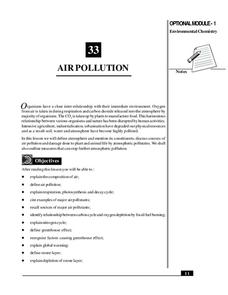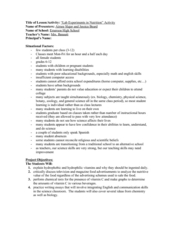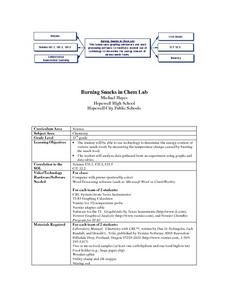Curated OER
Quality Control at Kality Krunchers Dill Pickle Factory
In a hypothetical scenario, food chemists use titration to concoct a brine solution for producing the crunchiest pickles. They also analyze store-bought pickle juices. In addition to reinforcing titration techniques, the lesson requires...
Curated OER
Chemistry Crossword
In this chemical reactions worksheet, students complete a crossword puzzle by figuring out the vocabulary words associated with 34 clues.
American Chemical Society
Chromatography - Color Clues
Here's an activity that will change how one sees color. Pupils try out an experiment on chromatography where they place a drop of food coloring on a coffee filter, add several drops of water, and watch the colors spread and separate....
Howard Hughes Medical Institute
How the Body Uses Fat
Not all fat is bad—eating good fats actually helps with weight loss. Learn how the body uses fat through a 27-slide presentation that breaks down the path fat takes from entering to exiting the body. Understanding why fat is helpful and...
Curated OER
The Chemicals of Living Cells
Designed to be a study guide or self assessment for high school biologists, the worksheet has good questions about cell chemistry, but would need to be reformatted if you want your kids to write their answers on the paper. There are also...
Curated OER
Real-World Projects: Challenges from the Polymer Industry
Two scenarios are presented for chemistry detectives to decipher. Both require the use of an infrared spectrometer and focus on the examination of polymer materials. In the first, lumps in polyethylene bottles are analyzed. In the...
National Institute of Open Schooling
Air Pollution
Seventy percent of the air pollution in China is due to car exhaust. Under the umbrella of environmental chemistry, learners extensively explore air pollution. From the makeup of our atmosphere to sources of major air pollutants, classes...
Curated OER
Lab Experiments in Nutrition Activity
Which vitamins should be ingested daily for maximum nutrition? Learners with ispecial needs or those who are pregnant focused on television and magazines advertisements that are used to sell food products. They conduct experiments and...
Curated OER
Respiration
This series opens with diagrams of experimental setups. A data table is displayed and questions are asked, indicating that the intent is for lab groups to perform the depicted experiments. At slide twelve, a coherent lesson about the...
American Chemical Society
Molecules in Motion
I heard that oxygen and magnesium were going out and I was like "O Mg." Pupils experiment with adding food coloring to water of various temperatures in order to determine how temperature impacts molecular movement. This is the...
Curated OER
Semipermeable Membranes and Bioaccumulation
Beginning biologists place a drop of food coloring into water of differing temperatures to observe the effect on the diffusion rate. They remove the shells from raw eggs and then experiment with osmosis over the remaining membranes....
Perkins School for the Blind
Polyatomic Ion Bingo
If your class is learning about polyatomic ions and needs a fun way to study those chemicals, then a bingo game might be right up your alley. This bingo game is intended to boost memorization skills, specifically the names of tricky...
Curated OER
Twirly Whirly Milk
Student observe the effect soap (or detergent) has on the movement of food color in milk. Pupils observe the properties of solids and liquids while making butter. They read a poem, Shaking, and listen for ryhming words. Studdents...
Curated OER
Lake Strata and Internal Waves
Use the classic density demonstration of placing a cola, a clear soda, and a diet soda into a tank of water. Then let learners attempt to pour some of the soda into layers in a clear container. The procedure explains a thermocline, and...
Curated OER
Lipids: Fats and Oils
A fantastic presentation with great images should improve student understanding of lipids and their involvement in the body. The chemistry of different fats, phospholipids, and steroids are explained. Additionally, the specific uses,...
Curated OER
Lipids: Fats and Oils
A fantastic presentation with great images should improve student understanding of lipids and their involvement in the body. The chemistry of different fats, phospholipids, and steroids are explained. Additionally, the specific uses,...
NOAA
Deep-Sea Ecosystems – Chemosynthesis for the Classroom
Photosynthesis was discovered in the 1770s, but chemosynthesis wasn't discovered until 1977. While many have performed an experiment to show how photosynthesis works, the activity allows pupils to observe chemosynthesis. Scholars set up...
Biology Junction
Macromolecules
In chemistry, organic means something contains a carbon base. A helpful presentation starts by defining macromolecules as large organic carbon molecules. Scholars answer questions about each topic on the associated worksheet. It covers...
Curated OER
Burning Snacks in Chem Lab
Students determine the energy content of various snack foods. They measure the temperature changes in various snack foods as the foods are burned in order to determine the foods' energy content. Students create graphs and data tables of...
Curated OER
Ranking Salinity
Students explain the uses of titration in chemistry and in industry. In this chemistry lesson, students determine the concentration of an unknown solution using titration. They calculate the percent of salt in saline solutions.
Curated OER
Matter: All That "Stuff"
In this chemistry worksheet, students learn about matter, including atoms, electrons, protons, neutrons, compounds and chemical properties. They use this information to answer the 10 questions on the worksheet. The answers are on the...
Curated OER
Kinetic Theory
Students describe how molecules of the different phases of matter move according to the Kinetic Theory. In this chemistry instructional activity, students observe and participate in teacher demos. They give real world applications of the...
Curated OER
Mixing Oil and Water
Students explore physical science by participating in a class experiment. In this chemistry lesson, students discuss what they predict will happen when cooking oil and water are blended together. Students utilize a plastic bottle, food...
Curated OER
Acidity
Sixth graders describe the physical and chemical properties of acids. In this chemistry lesson, 6th graders test the acidity of different solutions. They identify acids and bases using the pH scale.
Other popular searches
- 4th Grade Food Chemistry
- Food Chemistry Pdf
- Food Chemistry Quiz
- Food Chemistry Pancakes
- Food Chemistry Protein
- Food Chemistry Detection
- Food Chemistry Mcq
- Food Chemistry Pd
- Food Chemistry Cakes
- Food Chemistry Protien
- Food Chemistry Mc
- Food Chemistry Pancackes

























